Many people have radiotherapy as part of their cancer treatment.
Radiotherapy is a treatment that uses carefully calculated and measured doses of radiation. It is normally used to treat cancer but sometimes it is used to treat other conditions.
This page explains what to expect if you come to us for radiotherapy.
What to expect – Virtual tour of Radiotherapy unit at Liverpool
About radiotherapy
Radiotherapy affects all of the cells in the area being treated. It damages them and stops them growing and dividing. Normal cells have the ability to repair themselves from this damage but abnormal (cancer) cells are destroyed.
The aim of radiotherapy is to destroy as many abnormal (cancer) cells as possible while causing as little damage as possible to normal cells.
Treatments or ‘fractions’ are normally delivered daily with rest days to allow the healthy tissue to repair and the patient to recover.
There are many different treatment schedules: some require patients to have more than one treatment a day; some patients might be treated on consecutive days meaning that they will also have treatment at weekends.
Like any treatment, radiotherapy has risks and benefits. You might experience side-effects but we can manage them with medicines, other therapies and support.
Your doctor will tell you about your treatment, how it might affect you and any possible late effects. Any risks need to be balanced against your current health needs.
Radiotherapy is painless.
You should eat and drink normally before your treatment unless advised otherwise. Some patients may need to fast but we will let you know if this applies to you before your appointment. If you are on regular medication, please bring enough to cover your travel and treatment time.
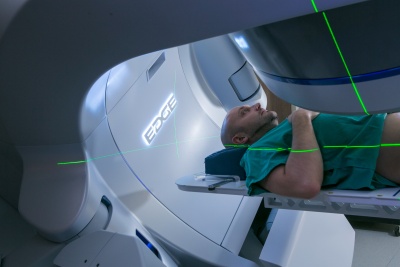
- External beam radiotherapy – where the radiation is delivered from a machine outside the body. This page is mainly about external beam radiotherapy
- Brachytherapy – also known as internal radiotherapy as a specialist machine (based at our main hospital in Liverpool) delivers radiation into body cavities or tissues. Find out more about having brachytherapy at The Clatterbridge Cancer Centre
Different types of external beam radiotherapy and brachytherapy are used to treat different types of cancer. These include:
- Stereotactic ablative radiotherapy (SABR)
- Stereotactic radiosurgery (SRS)
- Orthovoltage x-ray treatment for small skin cancers
- Papillon treatment for rectal cancers
Radiotherapy can be used alone or in combination with surgery and/or chemotherapy (drug treatment). It can be used to:
- Try to cure cancer (radical radiotherapy)
- Control (slow down) the growth of cancer
- Relieve the symptoms of cancer (palliative radiotherapy)
Your doctor will explain why they have recommended radiotherapy for you, and what you can expect.
If you are having external beam radiotherapy or most types of brachytherapy, you will not become radioactive as a result of treatment – it is safe for you to be with anyone afterwards, including children and babies.
However: A few procedures used in diagnosis and treatment involve tiny doses of radioactive material. If this applies to you, we will explain the safety precautions you need to take.
Our team and locations
Our specialist Radiotherapy teams will do all they can to make your treatment with us as easy and comfortable as possible for you. They will be there for you every step of the way.
We offer free tea and coffee during your visit along with access to drinking water stations. Parking is free at all our treatment locations.
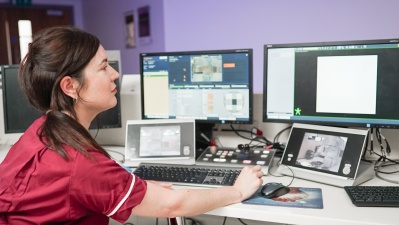
Radiotherapy General Manager
Lesley Woods
Quality and Operational Lead
Jill Jones
We offer radiotherapy at our three Clatterbridge Cancer Centres. Wherever possible, we will offer you treatment in the location that is most convenient for you but some treatments can only be delivered at our main centre in Liverpool.
Our Aintree and Wirral sites mainly specialise in radiotherapy to the breast, prostate, lung and rectum so you are likely to receive treatment there for these conditions but this is dependent on availability of appointments and on any additional supportive care required.
On occasion we will contact you to offer treatment at an alternative centre if your treatment machine is not available. We will discuss this with you and provide information for travel and parking.
Read more about our treatment locations and how to get there:
Deciding to have treatment
When you are diagnosed with cancer, your care will be discussed at a multidisciplinary team meeting (MDT) where different specialists will consider your treatment options.
Your doctor will discuss this with you during your appointment so you can decide what treatment is right for you. You can bring someone with you to this appointment (e.g. a family member, carer or friend) if you like. You can ask any questions you have about your treatment options. You can also talk about any worries you have.
When you are ready, your doctor will ask you to give your consent for treatment. Giving your consent confirms you are agreeing to have treatment. You do not have to give consent if you decide you do not want the treatment.
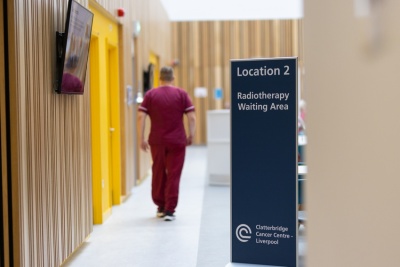
At this appointment, you will have a special type of scan. The scan lets us see inside your body so we can look at your cancer and the area around it.
These scans help us to:
- Design an individual treatment plan for you
- Calculate the individual dose of radiation and confirm the number of treatments you will receive
Pre-treatment appointments usually involve a CT scan and take around 30 minutes.
Sometimes you have other scans as well (such as a MRI or PET-CT scan) as part of your pre-treatment planning. If this is the case for you, we often book all the planning scans on the same day. We will send separate appointment letters for each type of planning scan.
During your planning scan, the therapeutic radiographers will put 2 or 3 small dots on your skin using a felt-tip pen. The dots are important for your treatment – they help us make sure you are in exactly the right position so the radiation targets the abnormal cells.
At the end of your scan, we will ask your permission to make these marks permanent by tattooing small dots. We recommend permanent marks, as you can’t wash them off. (We don’t always use permanent marks – for example, we wouldn’t use them on your face.)
If you choose not to have permanent marks, you need to take care of the marks, especially while washing, to avoid smudging or losing the marks. If this happens, tell your therapeutic radiographers when you arrive for your treatment appointment.
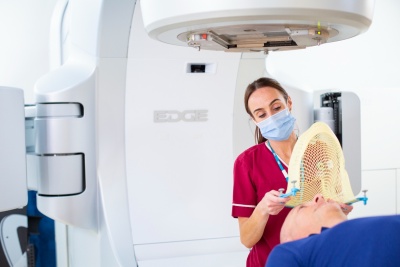
Each mask is individually made to make sure it fits you well and is comfortable. If you have facial hair that is thick or very long, please help us by trimming or thinning it beforehand if possible.
To make the mask, we use a sheet of plastic net attached to a frame that becomes soft and stretchy when heated in warm water. We place the warmed net on your face and neck, and gently press it around your features. As it cools over the next few minutes, the net becomes firm so it is ready to use straight away.
If you will be having weeks of radiotherapy to an area that will include your mouth, you will usually have a special dental check-up beforehand. You might need dental treatment before you start your radiotherapy.
An appointment will be made with a dentist at Liverpool University Dental Hospital who will assess your teeth, treat you (if needed) and explain how to take care of your teeth after radiotherapy to help to avoid problems in the future.
Find out how to get to your appointment, including hospital locations, directions and parking.
We know you might feel nervous about starting cancer treatment. Our therapeutic radiographers will do all they can to make it as easy and comfortable as possible for you. They will be there for you every step of the way.
You can ask them any questions you have and talk about anything that is worrying you. They can also help if you have any side-effects or feel unwell from your treatment.
The number and frequency of your appointments will depend on the type of radiotherapy you are having and which part of your body we are treating.
Most people come each day for treatment from Monday to Friday. Sometimes people have two treatments in one day or only come for treatment two or three times a week. We cannot guarantee specific appointment times.
Sometimes we might need to arrange your radiotherapy treatment around your other appointments such as chemotherapy or outpatient clinics.
Hospital transport
If you use hospital transport to travel here, you need to let us know when we book your appointments. Your appointment list will say what time hospital transport is likely to pick you up but don’t worry if it is late. Find out how to book hospital transport on our hospital appointments page.
Travelling by hospital transport might mean you stay longer with us while waiting for your transport home. Please bring any medication you might need and something to eat if you think you will need this.
You might like to bring something with you to help pass the time more comfortably:
- Something to read
- A phone or device for listening to music, watching TV or films, playing games and so on. We have free WiFi. Please wear headphones as a courtesy to others
- Your own drinks or snacks if you prefer them to the ones we provide
Find out about bringing someone with you when you come for treatment.
You will need to check in to reception to let us know you have arrived. Tell the receptionist you are there and they will explain where to wait for your appointment. In some locations, you can check in by using a self-check-in machine that will tell you where to wait for your appointment.
A member of the Radiotherapy team will collect you from the waiting area. They will ask you some questions to check you are able to have treatment. You will be weighed weekly by the radiotherapy support worker team.
Patient can bring one adult visitor or chaperone with them. For safety and comfort, we just ask you to follow these rules:
- One adult visitor or chaperone can accompany you whilst waiting for treatment.
- Visitors and chaperones cannot enter the treatment or scanner room due to radiation protection rules.
- Follow any local restrictions on visiting. (For example, sometimes visitors might not be allowed due to the risk of infection).
Having treatment
Your treatment will vary depending on what type of radiotherapy you are having and which part of the body is being treated.
When you go into the treatment room, the therapeutic radiographers will ask you to confirm your name and date of birth – this is so we can make sure we are giving the right person the right radiotherapy.
At your first treatment appointment, the team will explain what is going to happen and you can ask any questions you have.
Radiotherapy treatment only takes a few minutes but you will usually be in the treatment room for about 15 minutes. Most of this time involves us getting you into the correct position for your treatment. This is very important – we need to make sure the radiation targets the abnormal cells very precisely.
The team will set up the treatment machine (known as a linear accelerator or ‘linac’ for short). They will help you get into position with any equipment that is being used to help you stay still and be comfortable – for example, arm, knee or foot supports or a mask.
They will dim the light while they are doing this and will do a scan before starting treatment so they can check you are in exactly the right position.
When they have finished setting you up for treatment, they will leave the room to switch on the treatment machine. Don’t worry – the therapeutic radiographers will be watching you from the control room. You can raise your hand to get their attention any time if you need them to switch off the treatment machine.
When the treatment machine is on, you will hear a humming or buzzing noise. You will not feel anything during treatment. The treatment machine will move around you during treatment and you will need to stay very still.
Before radiotherapy planning and treatment, we ask all people of childbearing age (12 to 55 years old) if they could be pregnant. This might seem insensitive but the law requires us to check you are not pregnant before any procedure that uses radiation for diagnosis or treatment. The regulations are designed to protect the unborn child.
You will be asked to sign a form to show that we have discussed this with you. If you are in any doubt about the possibility of being pregnant, please discuss this with your radiographers before any procedure involving radiation.
The Clatterbridge Cancer Centre is a teaching hospital. A student radiographer might be part of your treatment team as practical training and experience is a vital part of their learning. All students are supervised by qualified radiographers at all times. If you have any concerns, please speak to a radiographer.
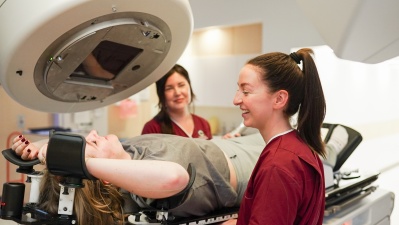
- Free WiFi
- Free tea and coffee
- Free parking – bring your appointment list with you to show you are eligible
Please use headphones as a courtesy to others if you are listening to something on your phone or device (e.g. music, TV, film, games, video call).
Our Radiotherapy team and volunteers are there for anything you need.
Eating and drinking is an important part of coping with and recovering from radiotherapy. Try to eat well and drink about 2 litres of fluid (3 to 4 pints) each day. If your condition or treatment is making it hard to eat, please tell us.
Please note: Some patients will be asked to fast (no food or drink) before each radiotherapy treatment. You will be informed if this applies to you.
We have lots of helpful advice and information. We can also refer you to a dietitian if you need this.
If you are having radiotherapy as an outpatient, you will usually see an on-treatment review radiographer (OTR) or a doctor for a review. This session will show as ‘RTMEDICALREVIEW’ on your appointment list. This will happen on the same day as you come for treatment. It is so we can:
- Monitor how the treatment is affecting you
- Give you information and advice on how to cope
- Review your medicines
If you have any side-effects or are worried about anything, please don’t wait until this appointment to tell us. You can tell your therapeutic radiographers or another member of the team any time.
Most radiotherapy patients are prone to developing temporary skin reactions. We will check your skin regularly and will give you advice and medication if you need it.
The likelihood and severity of any reaction depends on how the radiation is delivered, the number of days it’s delivered over and the dose received by the skin.
Usually, the more treatments you receive, the more likely you are to have a reaction on some or all of the skin being treated.
You might also have a reaction on your skin if you have all your radiotherapy in one dose or one day.
Changes often start around 10 to 14 days after the first treatment. The skin will become drier, redder and slightly irritated. You might experience a more severe reaction, depending upon the total dose of radiotherapy and the area of your body being treated. The skin will be very red, sore and it may become moist and feel warm.
You will be given appropriate medicines, including painkillers, creams and dressings, to help you cope.
After completing your radiotherapy, you can expect your skin condition to continue and even get worse over the following 10 to 14 days. The skin will then begin to heal and will recover within a few weeks. Keep using any creams you have been given – they can’t stop the reaction but they will help soothe the skin.
All patients receiving radiotherapy potentially risk developing long-term skin changes. These can include:
- Lighter or more varied skin colour
- Reduced skin elasticity – your skin might not stretch and bounce back as easily
- Thin, spidery red lines called telangiectasia – this is rare
We will discuss the long-term risks of skin changes with you when we ask for your consent for treatment. If you are more at risk, we will discuss this with you in more detail.
In practice, the long-term risk is greatly reduced thanks to new equipment that reduces the dose to the skin.
Treatment side-effects and complications
Cancer treatment can cause side-effects or other health issues. Everyone copes with treatment differently. How you cope is down to many factors including:
- Your general health
- The effects of previous treatment, such as surgery
- The number of hospital visits (especially if you are an outpatient)
- Having to arrange your life around your treatment
- Other commitments you have, such as working or caring for another person
Tell your clinical team if you have any side-effects or complications – they are there to help. Side-effects depend on many factors including:
- The total dose
- The number of treatments
- The area of the body treated
Try not to compare yourself to other patients as everyone is different:
- It is normal to feel tired after treatment
- Some people have very few or mild side-effects
- Some side-effects are temporary – they happen during your treatment and last for a few weeks after your treatment ends
- Other side-effects might continue for weeks or months
- Long-term or permanent side-effects can occur but they are rare
We will explain what side-effects you might experience and how to cope with them.
As you go through your treatment, your feelings and your ability to cope might change. Tell us how you are feeling so that we can give you information, support and medicines.
If you are having radiotherapy as an outpatient, the Radiotherapy team are responsible for your cancer care as well as giving your radiotherapy. They will check how you are coping with the effects of treatment. Please tell them how you feel so they can give you their advice and arrange any further support or care that you need.
Some side-effects and complications can be very serious.
If you feel very unwell during or after your cancer treatment, it is important to contact us straight away. Our specialist Hotline nurses are available 24 hours a day, seven days a week on 0800 169 5555.
Call our Hotline straight away if:
- You have a temperature over 37.5°C (99.5°F)
- You suddenly feel unwell, even with a normal temperature
- You have symptoms of an infection – these include feeling shivery and shaking; a sore throat; a cough; breathlessness; diarrhoea; needing to pee frequently or feeling pain or discomfort when you pee
- Your temperature goes below 36°C (96.8°F)
Our Hotline nurses can assess your symptoms and offer expert advice on what to do next.
After treatment
As you get close to the end of your radiotherapy treatment, we will tell you what to expect over the next few weeks and months.
Most people see a cancer doctor (oncologist) or specialist nurse a few months after finishing radiotherapy. This appointment is usually at your local hospital. We will discuss your follow-up appointment with you.
We will write to your GP about the treatment you have had and explain anything they need to know when caring for you.
If you are under the care of a district or Macmillan nurse, it is good for you to contact your nurse (if you haven’t already done so) to tell them that you have completed your radiotherapy treatment.
If you need further nursing care, we can refer you for this.
Some people recover quickly but it can take many months before you feel that you are fully recovered.
If you are feeling low or experience mood swings, it may be useful to talk to your GP or specialist staff in cancer care that have been caring for you who can refer to psychological support services when required.
Some people find it useful to have the support of others who have experience of cancer by attending a local support group. Our Cancer Information and Support Centre team can advise you on this. They can also offer advice and support to people caring for someone with cancer.
Maggie’s Wirral is a place for people with cancer and those supporting them. It offers lots of activities, courses and support – you can also just drop in for a coffee and a chat with people who understand.
Macmillan Cancer Support also have lots of useful information, advice and support.
What to expect – Virtual tour of Radiotherapy unit
This virtual reality video walks through Clatterbridge Cancer Centre – Liverpool to show you what to expect when you attend for your first radiotherapy appointment.
Rad Chat is a patient-friendly website that contains podcasts and resources that are suitable for patients and staff. It features discussion with patients and videos of what to expect, along with links to other useful resources.
Link to final version of detailed Radiotherapy leaflet
Any other patient info leaflets to link to? (We need word versions of the latest approved document in date on QPulse)